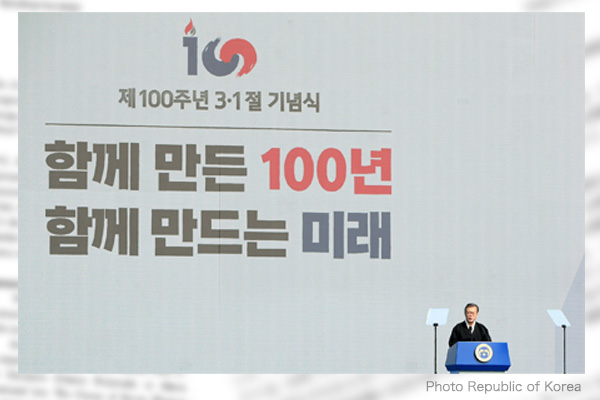On March 1, South Korean President Moon Jae In delivered an address to mark the centennial anniversary of the March 1 Independence Movement that took place in 1919 for Korea's independence from Japan's rule. Most of Japanese news media appreciated the address as giving considerations to Japan due to the absence of any direct anti-Japan criticism. However, I found the address further clarified the Moon administration’s dangerousness and anti-Japan stance.
More emphasis on approaching to North than cooperation with Japan, U.S.
In the address, President Moon made clear his goal of withdrawing from the de facto trilateral Japan-South Korea-U.S. alliance and forming a unified federation with the North Korean dictatorship.
Even though South Korea faced North Korean nuclear missile threats after the previous day’s U.S.-North Korea summit breakdown, President Moon told a dreamy story where North Korean military threats would have been over, citing “the spring of peace that arrived on the Korean Peninsula.” He also said, “Unification need not be far away.” “Progress in inter-Korean relations will lead to the normalization of North Korea’s relations with the United States and Japan,” Moon said, vowing to give priority to Seoul’s approach to Pyongyang at a time when Japan, the U. S. and South Korea are required to step up pressure on the North to have them implement the denuclearization.
Describing “the ideological hostility” as impeding peace, Moon attacked anti-communist conservatives within South Korea in a manner to call for wiping out the vestiges of pro-Japanese collaborators.
Japanese practices to label independence activists as “Reds” to justify their crackdowns are still seen as the vestiges of Japanese imperialists, Moon said. “Still now in our society, the word ‘Reds’ is being used as a tool to vilify and attack political rivals, and a different kind of “Red Scare” is running rampant.” He meant that those who label political rivals as Reds to attack them are pro-Japanese collaborators who should be eliminated.
Two days before the address, former Prime Minister Hwang Kyo Ahn was elected leader of the conservative opposition Liberty Korea Party. Hwang harshly criticized the Moon administration for attempting to ruin the country. Those who were intoxicated with North Korea’s juche (self-reliance) philosophy have taken control of the Blue House presidential mansion, the administration and the National Assembly, he said. In the afternoon of March 1, 500 retired generals and admirals held an anti-government rally on Seoul streets. The Moon administration’s ideology has growingly been suspected as running counter to South Korea’s national policy of anti-communist liberal democracy.
Attacking conservatives by calling for wiping out pro-Japanese collaborators
In contrast, President Moon in his March 1 address concluded ideological arguments as the vestiges of Japanese imperialists and conservatives making such arguments as pro-Japanese collaborators.
President Moon took advantage of the call for wiping out pro-Japanese collaborators to attack conservatives. As a result, none tries to improve soured Japan-South Korea relations because those doing so are considered pro-Japanese. In his address, Moon urged Japan to make “concerted efforts” with South Korea to substantively heal the pain of victims. He thus made clear that he has no plan to correct South Korean Supreme Court rulings on wartime Korean workers that violate international law.
President Moon in the address noted that some 7,500 Koreans were murdered in the March 1 Independence Movement in 1919, leading some in Japan to see the death estimate as problematic. In fact, the National Institute of Korean History published its latest research on February 20 concluding the number of deaths in the movement as 934 (see my article on the Rondan column on the JINF website). President Moon delivered the anti-Japan address ignoring the research by his country’s national institute.
Tsutomu Nishioka is a senior fellow and a Planning Committee member at the Japan Institute for National Fundamentals and Visiting Professor at Reitaku University. He covers South and North Koreas.


